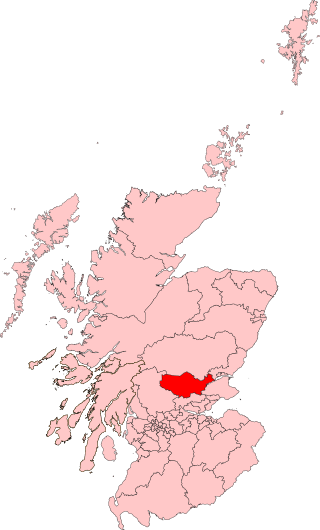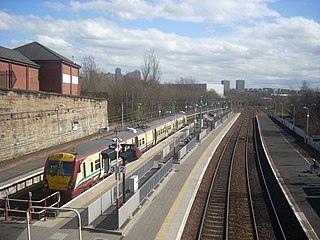
Glasgow Central is a constituency of the House of Commons of the Parliament of the United Kingdom. In its current form, the constituency was first used at the 2005 general election, but there was also a Glasgow Central constituency that existed from 1885 to 1997. The sitting MP is Alison Thewliss of the Scottish National Party (SNP), who was first elected in May 2015. This constituency was also the seat of the former Conservative Prime Minister Bonar Law, who was the shortest-serving UK Prime Minister of the twentieth century.

East Dunbartonshire is a county constituency of the House of Commons of the Parliament of the United Kingdom (Westminster). It elects one Member of Parliament (MP) by the first past the post system of election. The seat is possibly best known for formerly being the constituency of Jo Swinson, the former Leader of the Liberal Democrats who was defeated at the 2019 general election. The current MP for the constituency is Amy Callaghan of the Scottish National Party (SNP).

Edinburgh Central was a burgh constituency of the House of Commons of the Parliament of the United Kingdom from 1885 to 2005. It elected one Member of Parliament (MP) by the first past the post system of election.
Glasgow Bridgeton was a parliamentary constituency in the city of Glasgow. From 1885 to 1974, it returned one Member of Parliament (MP) to the House of Commons of the Parliament of the United Kingdom, elected by the first-past-the-post voting system.

Glasgow Camlachie was a burgh constituency represented in the House of Commons of the Parliament of the United Kingdom from 1885 until 1955.
Glasgow Gorbals was a parliamentary constituency in the city of Glasgow. From 1918 until 1974, it returned one Member of Parliament (MP) to the House of Commons of the Parliament of the United Kingdom, elected by the first-past-the-post system.
Glasgow Govan was a parliamentary constituency in the Govan district of Glasgow. It was represented in the House of Commons of the Parliament of the United Kingdom for 120 years; from 1885 until 2005, returning one Member of Parliament (MP) elected by the first-past-the-post system.
Glasgow Hillhead was a parliamentary constituency represented in the House of Commons of the Parliament of the United Kingdom from 1918 until 1997. It elected one Member of Parliament (MP) using the first-past-the-post voting system.
Glasgow Partick was a burgh constituency represented in the House of Commons of the Parliament of the United Kingdom from 1918 until 1950.
Glasgow Pollok was a burgh constituency represented in the House of Commons of the Parliament of the United Kingdom from 1918 until 2005, when it was replaced by Glasgow South West. It elected one Member of Parliament (MP) using the first-past-the-post voting system.

Glasgow Shettleston was a burgh constituency represented in the House of Commons of the Parliament of the United Kingdom from 1918 until 2005. The Shettleston area's representation is now covered by Glasgow Central and Glasgow East.
Glasgow St. Rollox was a burgh constituency represented in the House of Commons of the Parliament of the United Kingdom from 1885 until 1950. It elected one Member of Parliament (MP) using the first-past-the-post voting system.

Glasgow Tradeston was a burgh constituency represented in the House of Commons of the Parliament of the United Kingdom from 1885 until 1955. It elected one Member of Parliament (MP) using the first-past-the-post voting system.
Glasgow Maryhill was a parliamentary constituency represented in the House of Commons of the Parliament of the United Kingdom from 1918 to 2005 when it was subsumed into the new Glasgow North and Glasgow North East constituencies. It elected one Member of Parliament (MP) using the first-past-the-post voting system.

Perth was a constituency of the House of Commons of the Parliament of the United Kingdom from 1832 to 1918, 1918 to 1950, and 1997 to 2005. From 1832 to 1918 it was a burgh constituency. From 1918 to 1950, and 1997 to 2005, it was a county constituency. During each of the three periods it elected one Member of Parliament (MP).

Springburn railway station serves the Springburn district of Glasgow, Scotland. The station is 1+1⁄4 miles (2.0 km) north of Glasgow Queen Street station on the Cumbernauld Line and is a terminus of the Springburn branch, a spur from Bellgrove station, on the North Clyde Line.

Bellgrove Railway Station is in the East End of Glasgow, Scotland, serving the city's Calton, Gallowgate and south Dennistoun neighbourhoods. The station is approximately 1 mile (1.6 km) to the east of Glasgow Queen Street, and is managed by ScotRail.

Cumbernauld railway station serves the town of Cumbernauld, Scotland. The station is managed by ScotRail and is located on the Cumbernauld Line, 14 miles (23 km) north east of Glasgow Queen Street station and the Motherwell to Cumbernauld Line, 11+3⁄4 miles (18.9 km) north of Motherwell. Trains serving the station are operated by ScotRail.
Belfast was an Irish borough constituency in the House of Commons of the United Kingdom of Great Britain and Ireland. Comprising the city of Belfast, it elected one Member of Parliament (MP) from 1801 to 1832, and then two MPs from 1832 until the constituency was divided by the Redistribution of Seats Act 1885 before the 1885 general election.

Springburn/Robroyston is one of the 23 wards of Glasgow City Council. Created as Springburn, in 2007 and in 2012 it returned three council members, using the single transferable vote system. For the 2017 Glasgow City Council election, the boundaries were changed, the ward increased in size and population, was renamed Springburn/Robroyston and returned four members.












